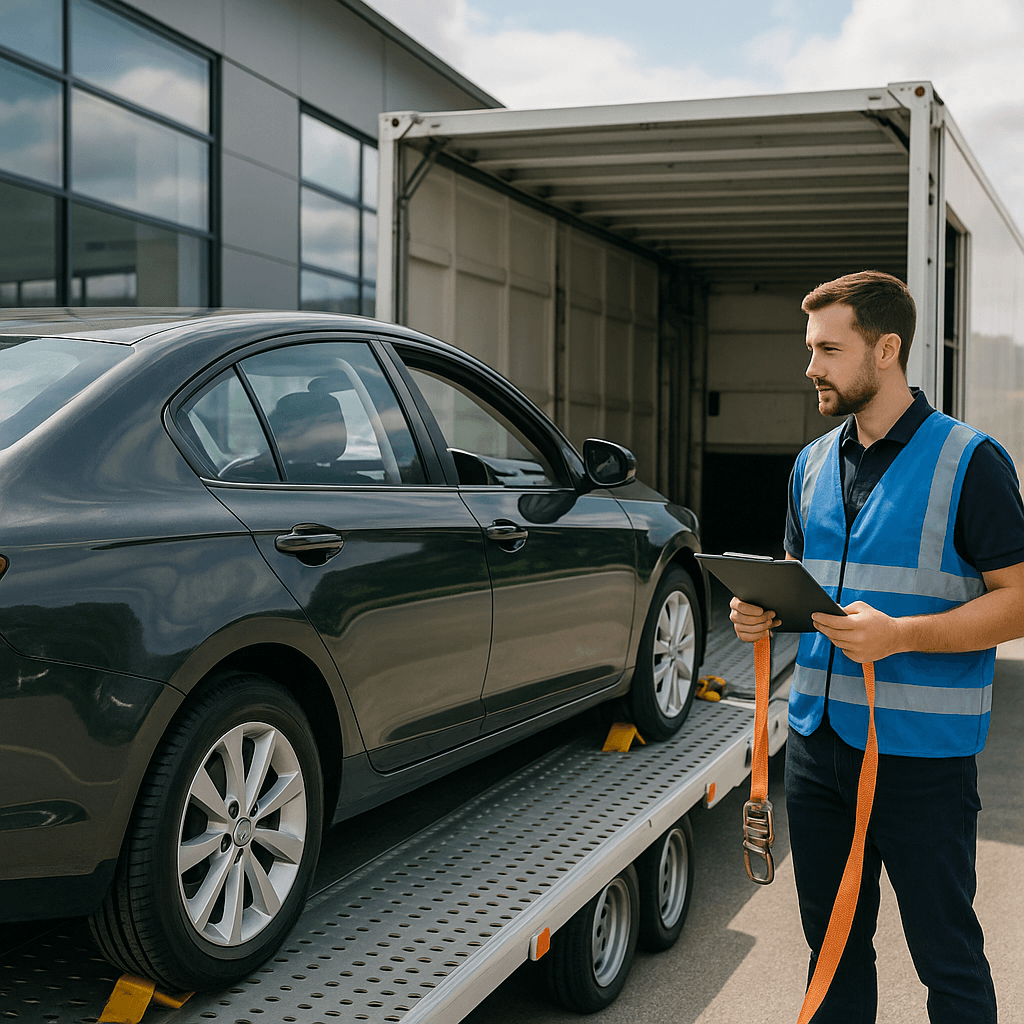To prepare a car for transport, start with a thorough cleaning, remove personal items, and ensure all mechanical functions are operational.
- Introduction
- Documentation and Legal Requirements
- Preparing Your Vehicle Physically
- Why Choose Next Level Motors for Car Transport
- Frequently Asked Questions
- Do I need to be present during car pickup and delivery?
- What documents should I have ready before transport?
- How should I prepare my car’s interior?
- What does a car transport service typically include?
- How long does car transport take within New Zealand?
- Can I transport my car with a full tank of fuel?
- What should I do if my car gets damaged during transport?
- Why choose Next Level Motors for car transport in the North Island?
Whether you’re relocating across the North Island or sending your vehicle to a far-off buyer, understanding how to prepare a car for transport is crucial. At Next Level Motors, we’ve assisted numerous clients in ensuring their vehicles are ready for the journey ahead, providing peace of mind throughout the process.
Inspect and Clean Your Vehicle
The first essential step in getting your car ready is a comprehensive clean and inspection. Washing your vehicle isn’t merely about appearance—it’s about making sure you can identify any existing scratches, dents, or damages before transportation. Document these with detailed photographs for your records.
In addition to the exterior, clean the interior of your car as well. Remove all personal belongings as they can shift during transport, potentially causing damage. Clearing out your car interior helps prevent any disputes over damages that may arise later.
Check Mechanical Functions
Your car needs to be mechanically sound before it’s shipped. Ensure that the battery is fully charged, and all fluids, such as oil, brake, and coolant fluids, are at the appropriate levels. Check tyre pressure and secure any loose parts. Proper maintenance can prevent unexpected issues during transport.
Preparing your car for transport involves a combination of cleaning, inspecting, and addressing any mechanical concerns, thus ensuring a smooth journey and confident delivery, supported by the professional guidance at Next Level Motors in North Island, New Zealand.

Documentation and Legal Requirements
When you plan to prepare a car for transport, especially in the context of New Zealand, understanding the documentation and legal requirements is absolutely essential. The paperwork not only ensures the legitimacy and smooth transit of your vehicle but also protects you from potential disputes or compliance issues. This section delves into the significant documents and legalities you need to consider to facilitate a hassle-free transport experience.
Required Documents
Before embarking on the transport journey, gather all the essential documents that will ensure legal compliance and operational smoothness. These include the vehicle registration certificate, which proves ownership and is necessary to authenticate the vehicle’s identity during transport. Another critical document is the transfer of ownership form should you be moving a sold vehicle. It prevents any legal entanglements related to the previous ownership once the transport is complete.
Insurance papers are equally crucial. Your current insurance policy should offer coverage during the transport period. Checking with your insurance agent to confirm the extent of this coverage can save you from unexpected liabilities. Additionally, if you are exporting the vehicle from New Zealand, an export certificate will be needed to clear customs both locally and internationally.
Legal Regulations and Compliance
The New Zealand Transport Agency (NZTA) stipulates specific transport regulations that need to be adhered to. Knowing and complying with these regulations is important to avoid any legal complications during the transport process. For instance, any necessary roadworthiness certificates must be up to date. Make sure the vehicle is certificated fit to travel the designated routes, which include inspections for safety and emissions if applicable.
Moreover, if the vehicle transport involves a third-party logistics provider or transport company, ensure they are licensed and meet all operational regulations. This includes having the appropriate permits for operating transport vehicles and adherence to transport safety standards. Failure to comply with these legal frameworks could result in fines or delays in the transport schedule.
Customs and Import/Export Considerations
If your transport involves crossing international borders, customs considerations play a significant role. For vehicles leaving or entering New Zealand, customs declarations must be carefully filled out and submitted. Each country’s customs process has unique requirements; therefore, liaising with customs agencies ahead of time can help in understanding the specific import/export duties and taxes involved.
Also, remember to check if there are any quarantine regulations that apply to the country of destination. In some cases, vehicles could be subject to a thorough inspection for biosecurity risk management. Consulting with freight or customs brokers can be invaluable to guide the documentation process according to the respective regulatory requirements.
Understanding and executing these documentation and legal requirements effectively ensures that your car’s transport process is seamless. With all paperwork in order and legal checks thoroughly conducted, you’ll pave the way for a more straightforward and successful vehicle shipping experience.

Preparing Your Vehicle Physically
While documentation is crucial, physical preparation of your car is equally vital for a smooth transport process. Ensuring that your vehicle is in optimal condition can prevent damage during transit and facilitate easier handling by transport professionals. This section provides a comprehensive guide on how to physically prepare your car for its journey, with actionable tips and best practices.
Clean and Secure Your Vehicle
Before loading your car for transport, it’s essential to give it a thorough cleaning. A clean exterior makes it easier to complete an inspection, as any existing dents or scratches will be more visible. Ensure the interior is free from personal belongings, which could shift and cause damage during transit. Additionally, any removable parts like radio antennas or custom spoilers should be detached and securely stored. This reduces the risk of accidental damage or loss during the journey.
Check Fluid Levels and Battery
Another key step before transport is evaluating your car’s fluid levels and battery charge. Ensure that oil, coolant, and other fluids are at recommended levels to prevent leaks. Sealing or tightening fluid caps can further minimise this risk. The battery should be fully charged and securely mounted to avoid potential issues during loading and unloading. While it’s important your vehicle can be started during and after transport, it’s advisable to keep the fuel level low to decrease weight and fire hazard risk.
Inspect and Inflate Tyres
Properly inflated tyres are a critical component in preparing a car for transport. Underinflated or overinflated tyres can cause stability issues, increasing the risk of damage. Check the tyre pressure against the manufacturer’s specifications and adjust as needed. Checking for uneven wear or damage is also crucial, as these can indicate underlying issues that should be addressed prior to transport. Properly serviced tyres will ensure better support during transit and help avoid unpleasant surprises upon arrival.
With your vehicle physically prepared and its mechanical integrity ensured, the transport process will be more streamlined and secure. Next, discover why Next Level Motors is your trusted partner in the North Island for seamless car transport solutions.
Why Choose Next Level Motors for Car Transport
When it comes to transporting your vehicle, choosing the right partner can make all the difference. Located in the beautiful North Island, New Zealand, Next Level Motors stands head and shoulders above the competition due to its commitment to excellence in the vehicle transport service. Here’s why discerning vehicle owners trust Next Level Motors with their car transport needs.
Experienced Local Experts
Next Level Motors has a deep understanding of the unique geographical and logistical challenges posed by the diverse landscapes of New Zealand. With years of experience operating in the North Island, they have perfected the art of safe and reliable car transport. Their local expertise ensures that they can navigate both urban environments and rural roads with the same level of care and proficiency, guaranteeing that your vehicle reaches its destination unscathed.
Moreover, the team at Next Level Motors is composed of professionals who are not only well-versed in the intricacies of vehicle transport but are also passionate about what they do. Their familiarity with local regulations and freight routes means you will benefit from a streamlined service that anticipates and resolves potential issues before they become problems.
What Sets Us Apart
Choosing Next Level Motors means opting for unparalleled service and peace of mind. One of the key differentiators is their attention to detail and client-centered approach. They prioritise customer satisfaction and believe in keeping communication channels open throughout the transport process. This client-first mentality is reflected in their consistently glowing reviews and high customer retention rates.
Additionally, Next Level Motors offers comprehensive insurance options as part of their service package, providing an extra layer of security for your peace of mind. This means that, should the unexpected occur, your vehicle is well-covered. Their modern fleet of transport vehicles is equipped with state-of-the-art technology ensuring a safe and efficient journey for your car.
If you are considering a reliable and reputable vehicle transport service that values both the safety of your vehicle and customer satisfaction, look no further. Choose Next Level Motors for a seamless car transport experience that not only meets but exceeds expectations.
Stay tuned for the next section, where we address common queries in our Frequently Asked Questions section. This segment will provide answers to the most prevalent questions about preparing a car for transport, offering readers additional clarity and confidence.
Frequently Asked Questions
Do I need to be present during car pickup and delivery?
While it’s not strictly necessary, being present for both pickup and delivery allows you to inspect the vehicle thoroughly and address any concerns directly with the transport personnel.
What documents should I have ready before transport?
You should prepare your vehicle’s registration certificate, insurance details, and any required permits to ensure a smooth transport process.
How should I prepare my car’s interior?
It’s advisable to remove personal belongings and valuables from the car to prevent any loss or damage. Ensure the car is clean and free of clutter.
What does a car transport service typically include?
A car transport service generally includes pickup and delivery, transport insurance, and, in some cases, a pre and post-inspection of the vehicle.
How long does car transport take within New Zealand?
Transport times can vary depending on the distance and service type, but typically range from 2 to 7 days within the North Island.
Can I transport my car with a full tank of fuel?
It’s best to leave your vehicle with only a quarter tank of fuel to reduce weight and ensure safety during transport.
What should I do if my car gets damaged during transport?
Immediately report any damage to the transport company and document it with photographs. Refer to your insurance policy to understand coverage and claims procedures.
Why choose Next Level Motors for car transport in the North Island?
Next Level Motors offers unparalleled local expertise and a reputation for reliability. Their customer-first approach ensures a seamless and stress-free transport experience across the North Island.






